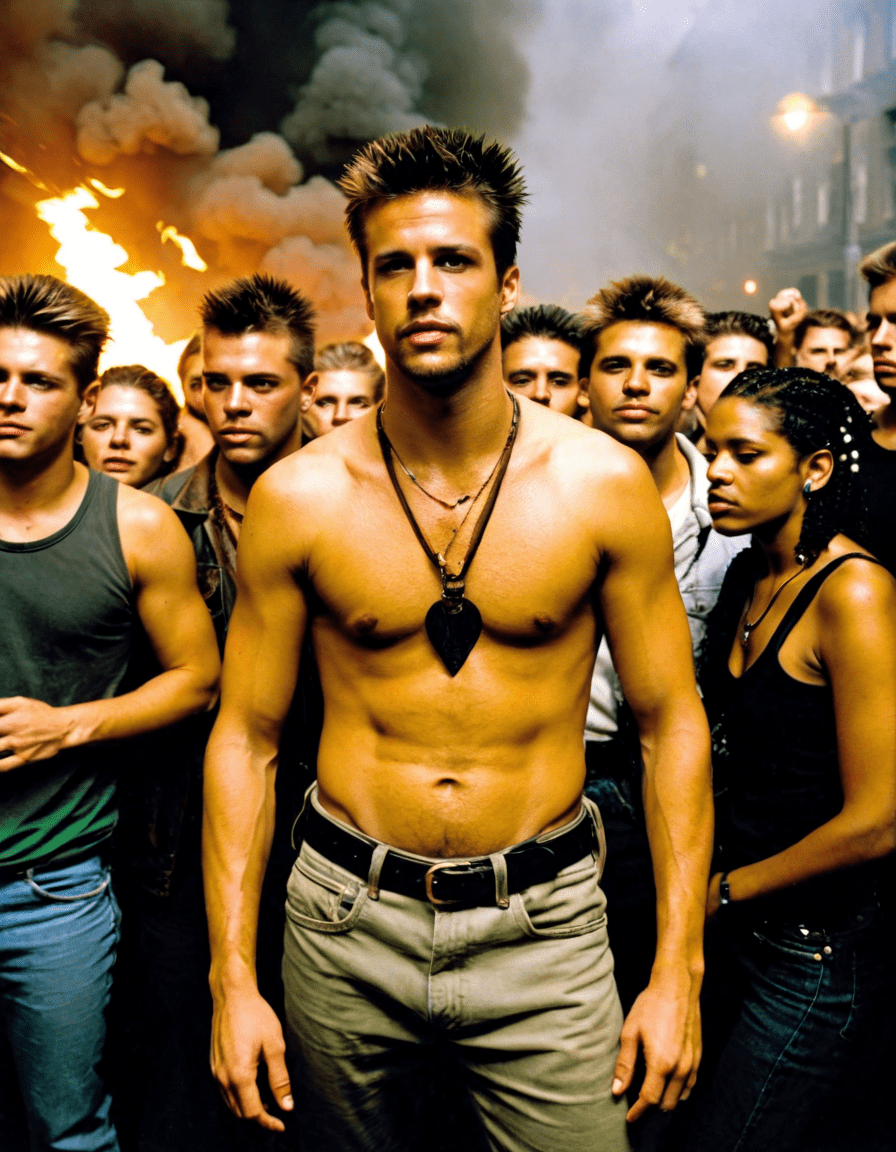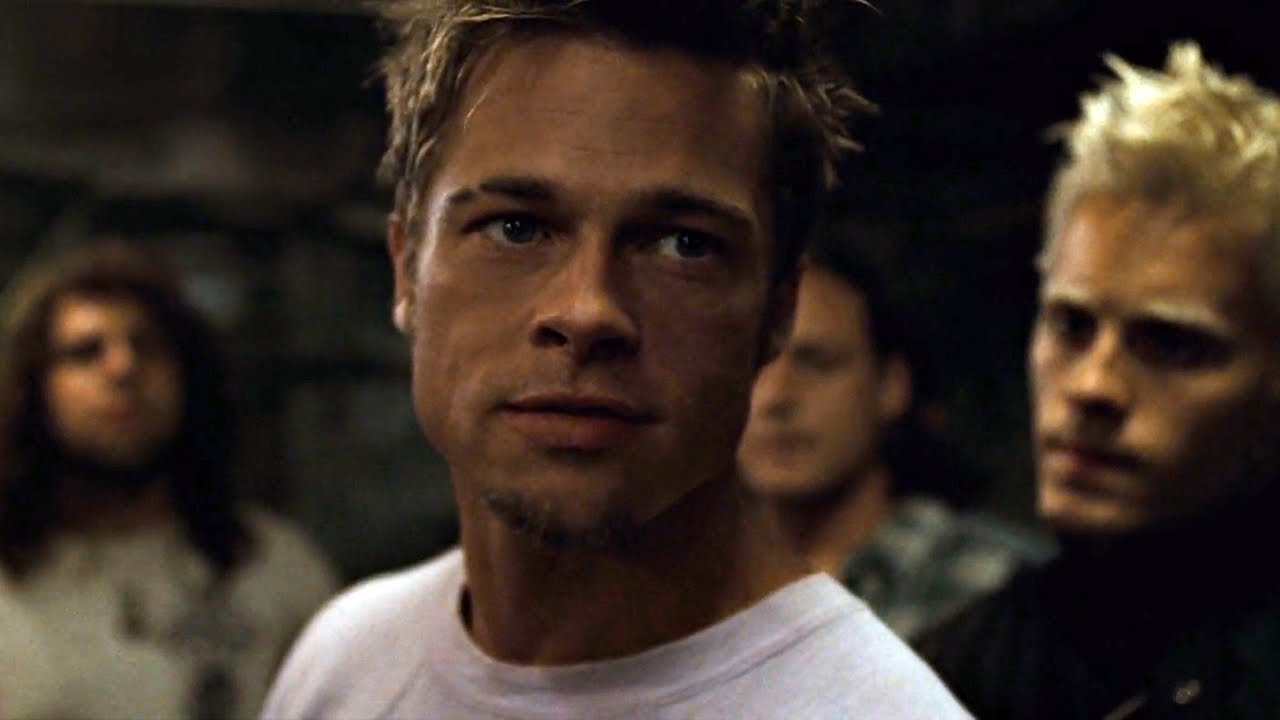Tyler Durden stands tall as one of cinema’s most iconic antiheroes, forever etched in the minds of viewers thanks to Brad Pitt’s unforgettable performance in the 1999 cult classic “Fight Club.” This isn’t just another film; it’s a cultural phenomenon that challenges the very fabric of consumer culture and societal expectations. Tyler Durden isn’t simply a character; he’s a philosophy in motion—one that goads us to cast aside our materialistic chains and embrace the chaos that is life. His famous quip, “The things you own end up owning you,” stirs us to reflect on our obsession with possession, nudging us toward reclaiming our identities and finding liberation in disorder.
The Philosophy of Tyler Durden: A Break from Consumer Culture
Tyler Durden’s radical perspective is strikingly relevant today as it was over two decades ago. He critiques a society drowning in consumerism, urging individuals to shun mainstream ideals and rediscover their essence. In our current landscape, where brands like Apple and fast-fashion industry giants promote a cycle of endless consumption, Durden’s message feels like a breath of fresh air. Movements like Minimalism and the “Buy Nothing” initiative echo his beliefs, pushing against the tide of material obsession.
The “Fight Club” philosophy resonates deeply amidst the daily grind of societal constraints. By rejecting conventional definitions of success, Durden paves the way for an authentic self-expression that inspires many today. The rise of social media influencers who tout “living simply” and the growth of alternative lifestyles showcase how Tyler’s ideology continues to challenge contemporary society.
Additionally, we can see Tyler Durden’s principles manifesting in people convening in community spaces to share resources and ideas, emphasizing collaboration over competition. There’s a raw beauty in this collective rejection of consumerism, mirroring Durden’s revolutionary spirit.

Tyler Durden vs. Modern Antiheroes: A Comparison with Joel Edgerton’s Characters
While we dive into Tyler’s depth, it’s crucial to acknowledge the tapestry of antiheroes that have emerged since “Fight Club.” Joel Edgerton’s complex characters in films like “The Gift” and “Warrior” provide a rich comparison to Durden’s brazen philosophy.
In this way, we witness the evolution of antiheroes from the reckless charm of Tyler Durden to the emotional complexities of modern characters portrayed by actors like Joel Edgerton. These portrayals offer a fresh lens on societal expectations and emotional narratives.
The Legacy of Fight Club: How Tyler Durden Shaped Film and Ideology
“Fight Club” didn’t just reshape cinema; it birthed a cultural dialogue that continues to influence generations. The ethos of Tyler Durden has inspired countless underground movements, including genuine fight clubs that mirror the film’s chaotic rebellion against conformity. However, its impact runs deeper than just physical bouts, sparking conversations about modern masculinity that permeate through today’s societal fabric.
Online communities across platforms like Reddit and TikTok champion Durden’s teachings, transforming him into a quasi-hero for those seeking to challenge conventional views on identity, capitalism, and maturity. The film has sparked dialogue around mental health, as today’s audiences revisit its themes through a contemporary lens, acknowledging the complexities surrounding toxic masculinity and emotional expression.
Moreover, “Fight Club” has evolved as a cultural artifact, spurring discussions that adapt Tyler’s ideology to the issues we face in 2026. The film continues to be a catalyst for challenging societal norms, signifying a fight for personal truth amidst the chaos of modern life.

Tyler Durden’s Influence on Fashion and Aesthetics
Tyler Durden’s visual representation has undeniably left an enduring impact on fashion, popularizing a raw, anti-establishment aesthetic that continues to captivate audiences in 2026. From his iconic leather jacket to a carefully disheveled look, Durden’s style resonates with a countercultural spirit that younger generations now adore. Brands like Off-White and Supreme have embraced the essence of Durden’s fashion, intertwining rebellion with sartorial artistry.
Today, we witness a resurgence of ’90s grunge that symbolizes a collective fight against commercialism. The untamed, unrefined manner of dressing—think oversized silhouettes and vintage pieces—echoes Durden’s impact on an audience that values authenticity over sheer glamor. Current trends reveal a broader narrative: one that prioritizes self-expression over rigid fashion norms.
As designers continue to mine inspiration from the past, the fashion world finds itself entangled in the legacy of Tyler Durden’s style, echoing his defiant attitude towards mainstream aesthetics. The cultural significance of his character isn’t confined to a single movie but extends to our present, shaping how we express ourselves visually.
The Evolving Interpretations of Tyler Durden’s Ideals
As the digital age reshapes conversations, Tyler Durden’s philosophies are subject to reinterpretation. Emerging ideologies like eco-conscious movements are inspired by his radical rejection of consumerism. Concepts like zero waste and sustainable fashion resonate with those seeking to live authentically, echoing Durden’s principles of minimalism and intentional living.
The discourse surrounding toxic masculinity has also taken root, challenging the narrow interpretations of Durden’s character. Many newer analyses emphasize the importance of emotional vulnerability and connection, encouraging a more holistic understanding of masculinity that goes beyond mere rebellion.
Today, the narrative surrounding Tyler Durden intertwines discussions of mental health, fostering more open dialogues about self-expression, vulnerability, and the importance of emotional awareness. This evolution reflects a broader societal shift toward understanding complex identities, moving from silent suffering to advocacy for mental wellness.
Final Thoughts: The Enduring Impact of Tyler Durden
Tyler Durden remains a powerful symbol of resistance against societal constraints. His philosophy resonates deeply, provoking ongoing discussions about consumerism, identity, and the concept of masculinity in an increasingly digital landscape. As we navigate a society steeped in rapid consumer behaviors and superficial connections, Durden’s radical ideas challenge us to seek authenticity amidst chaos.
His legacy transcends sheer destruction; it serves as a call for understanding and redefining what it means to be truly free. Every generation leaves behind its heroes, and Tyler Durden is undoubtedly one of ours – a figure whose influence will continue to provoke thought, inspire rebellion, and lead us towards a more authentic existence.
Let Tyler Durden remind us to question the status quo. As we delve deeper into the complexities of contemporary life, we must keep asking ourselves what it truly means to live meaningfully and authentically in a world that often seeks to define that for us.
Tyler Durden: The Iconic Antihero and His Radical Philosophy
The Origins of Tyler Durden
Tyler Durden, created by Chuck Palahniuk, isn’t just a fictional character; he’s a cultural phenomenon. Interestingly, Brad Pitt’s portrayal of him in Fight Club almost didn’t happen. David Fincher, the director, initially envisioned Johnny Depp in the role, but thanks to Pitt’s insistence and charisma, Durden became the iconic figure we know today. What many might not realize is that the film was so groundbreaking that it sparked intense discussions about consumerism—just like the waves that come crashing down on a surfer, as seen in bizarre events like shark attacks on surfers. In a similar vein, Tyler represents the fight against materialism, urging followers to break free from societal norms.
Philosophy and Pop Culture
One of the most memorable aspects of Tyler Durden’s philosophy is his audacious dismissal of conventional success. He criticizes society’s obsession with possessions, suggesting that the ultimate freedom lies not in accumulation but in self-destruction. This rebellious spirit resonates with many famous artists, including rock legends like Grace Slick, who also challenged norms through their music. The film’s mantra of “You are not your job, you are not how much money you have in the bank, encapsulates Durden’s fierce ideology and serves as a rallying cry for those fed up with the rat race. If only he had access to something like Zillow Houses For sale; he might have argued for a minimalist approach to living.
Trivia and Fun Facts
Did you know that Tyler Durden’s character has inspired countless pop culture references, even impacting the adult film industry? For instance, Madison Ivy, a well-known adult film star, credits the film’s themes for inspiring her choice of roles, proving how far-reaching Tyler’s impact is. Additionally, the film brought together a powerful cast, including Claire Holt, who’s made her own mark in Hollywood after the movie’s success. As audiences still explore Tyler’s philosophies, new narratives are emerging, similar to Wicked Part two, which keeps the essence of rebellion alive across different genres. No wonder Tyler Durden remains a relevant figure in conversations about societal values and personal identity!
In the end, Tyler Durden serves as a cautionary tale about the trials of modern life. His philosophy certainly resonates with many looking for meaning beyond the superficial. Even new stars like Skylar vox express admiration for what the character represents, reinforcing the idea that the fight against conformity is an endless battle worth exploring. In short, you don’t have to be in Abilene, Texas, or tuning into a film festival to appreciate what this character symbolizes; it’s a message that transcends boundaries.




![Tyler Durden | i like the way you kiss me - Artemas [4K EDIT]](https://www.cinephilemagazine.com/wp-content/cache/flying-press/57f9516be1250c7e6524bc9a3aa08779.jpg)



